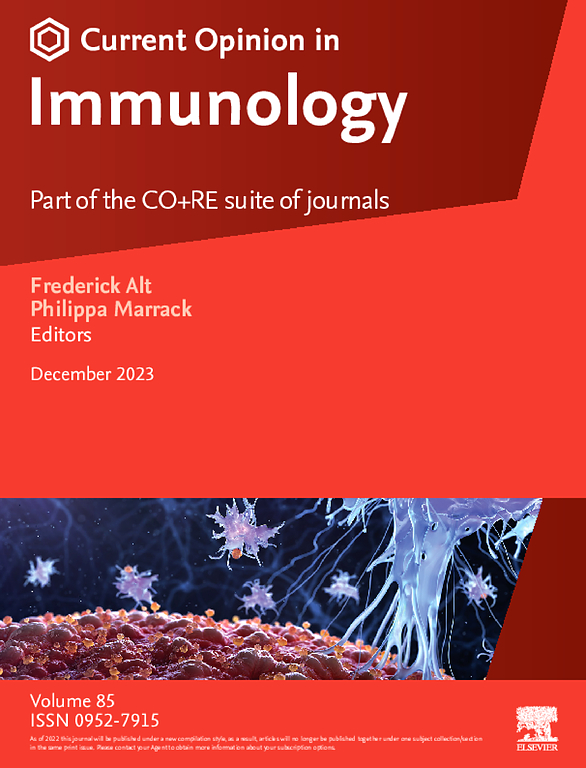The epidermal immune microenvironment plays a central role in the pathogenesis of psoriasis
IF 5.8
2区 医学
Q1 IMMUNOLOGY
引用次数: 0
Abstract
Psoriasis is a chronic immune-mediated skin disease whose inflammation can affect other systems and lead to various comorbidities. As a model inflammatory skin disease, while advances in mechanistic insights and targeted therapies have improved outcomes, unmet clinical needs persist. Modern technologies like single-cell sequencing and spatial transcriptomics reveal that skin immunity operates as a complex network involving neuroregulation, symbiotic microbial immunity, metabolic abnormalities, and reprogramming. These findings underscore the complexity of the local immune microenvironment in the skin and its central role in disease pathogenesis.
In psoriatic inflammation, the epidermal immune microenvironment — driven by keratinocytes, dendritic cells, T cells, and skin microbiota — emerges as a core pathogenic mechanism. Keratinocytes, acting as both inflammatory effectors and disease drivers, interact with immune cells to initiate and amplify responses. Studying this microenvironment offers novel therapeutic targets for psoriasis and related inflammatory skin diseases.
表皮免疫微环境在银屑病的发病机制中起核心作用
牛皮癣是一种慢性免疫介导的皮肤病,其炎症可影响其他系统并导致各种合并症。作为一种典型的炎症性皮肤病,虽然在机制认识和靶向治疗方面的进展改善了结果,但未满足的临床需求仍然存在。单细胞测序和空间转录组学等现代技术表明,皮肤免疫是一个复杂的网络,涉及神经调节、共生微生物免疫、代谢异常和重编程。这些发现强调了皮肤局部免疫微环境的复杂性及其在疾病发病机制中的核心作用。在银屑病炎症中,表皮免疫微环境——由角质形成细胞、树突状细胞、T细胞和皮肤微生物群驱动——成为核心致病机制。角化细胞作为炎症效应因子和疾病驱动因子,与免疫细胞相互作用,启动和放大反应。研究这种微环境为银屑病和相关炎症性皮肤病提供了新的治疗靶点。
本文章由计算机程序翻译,如有差异,请以英文原文为准。
求助全文
约1分钟内获得全文
求助全文
来源期刊
CiteScore
13.30
自引率
1.40%
发文量
94
审稿时长
67 days
期刊介绍:
Current Opinion in Immunology aims to stimulate scientifically grounded, interdisciplinary, multi-scale debate and exchange of ideas. It contains polished, concise and timely reviews and opinions, with particular emphasis on those articles published in the past two years. In addition to describing recent trends, the authors are encouraged to give their subjective opinion of the topics discussed.
In Current Opinion in Immunology we help the reader by providing in a systematic manner: 1. The views of experts on current advances in their field in a clear and readable form. 2. Evaluations of the most interesting papers, annotated by experts, from the great wealth of original publications.
Current Opinion in Immunology will serve as an invaluable source of information for researchers, lecturers, teachers, professionals, policy makers and students.
Current Opinion in Immunology builds on Elsevier''s reputation for excellence in scientific publishing and long-standing commitment to communicating reproducible biomedical research targeted at improving human health. It is a companion to the new Gold Open Access journal Current Research in Immunology and is part of the Current Opinion and Research(CO+RE) suite of journals. All CO+RE journals leverage the Current Opinion legacy-of editorial excellence, high-impact, and global reach-to ensure they are a widely read resource that is integral to scientists'' workflow.

 求助内容:
求助内容: 应助结果提醒方式:
应助结果提醒方式:


